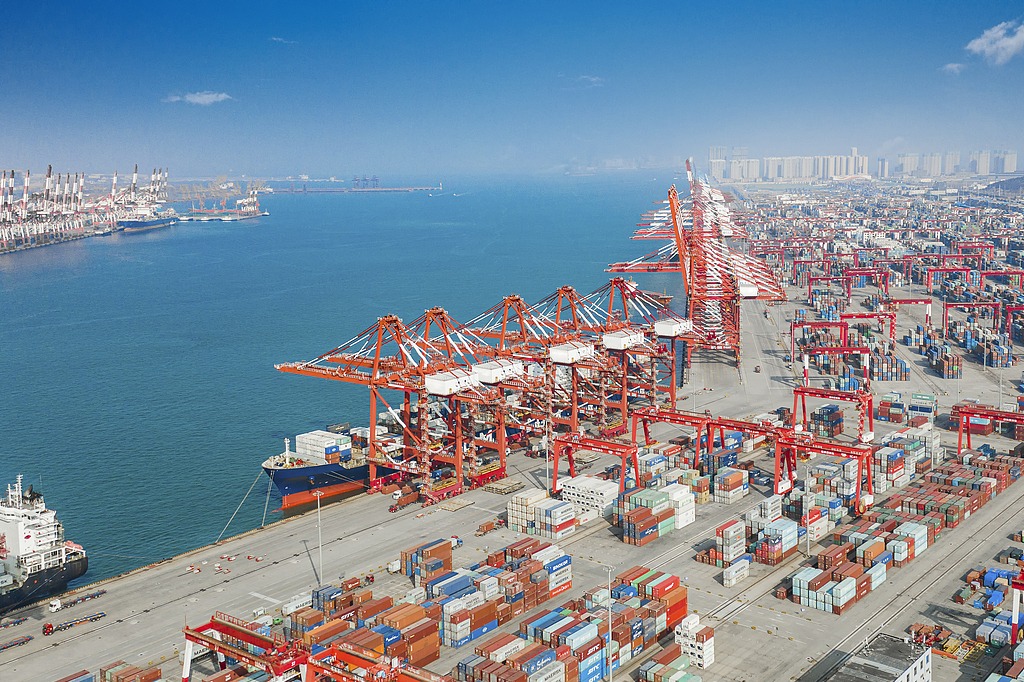US businesses raise imports over tariff fears
Retailers face potential policy change on duties and supply chain challenges
By BELINDA ROBINSON in New York | China Daily Global | Updated: 2024-09-03 09:11

US manufacturers, businesses and retailers are stockpiling some imported products and parts, especially those from China, because of uncertainty over tariffs heading into the US presidential election in November.
Between June and July, the peak season for retailers to build inventory for the holiday season, the volume of ocean shipments to the United States from China increased by more than 4 percent over last year, according to a report by Project44, a company that provides a digital supply chain platform for businesses.
The analysis suggests retailers are somewhat nervous over the tariff policy.
US President Joe Biden announced in May an increase in tariffs on more than $18 billion worth of goods from China. The duties were scheduled to start on Aug 1 but have been delayed until this month.
Manufacturers have asked for the higher tariffs to be reduced, delayed or abandoned, Reuters reported.
Biden raised tariffs on Chinese electric vehicles to 100 percent, and on semiconductors and solar cells to 50 percent. A 25 percent tariff was put on lithium-ion batteries and cranes, while steel, aluminum and solar cells imports will also cost more.
Vice-President Kamala Harris, the Democratic presidential candidate, has not said if she will keep the existing tariffs in place if she wins in November.
Charles Lutvak, a spokesperson for the Harris-Tim Walz campaign, told The New York Times that she will "employ targeted and strategic tariffs to support American workers, strengthen our economy and hold our adversaries accountable".
Republican presidential candidate Donald Trump has floated the idea of tariffs of 60 percent or higher on imports from China. In 2018, the Trump administration enacted tariffs between 10 percent and 50 percent on $283 billion of goods from China.
China responded with tariffs of its own. A trade agreement was reached in 2019, but Biden has kept the tariffs in place and also extended them.
Trump said tariffs will bring back US jobs. "We are going to have 10 to 20 percent tariffs on foreign countries that have been ripping us off for years," he said in a speech in North Carolina on Aug 14.
Mary Lovely, a professor emeritus of economics at Syracuse University, told China Daily, "Tariffs may create jobs in directly protected sectors, but they cause job loss in sectors that use imported intermediate and capital goods."
Businesses are also aware of potential strikes at East Coast and Gulf Coast ports this fall that could affect imported goods before November, the National Retail Federation found.
Most recent imports into the US arrived at ports on the West Coast rather than the East Coast as the contract between the International Longshoremen's Association and the US Maritime Alliance covering East Coast and Gulf Coast ports is due to expire on Sept 30. A breakdown in negotiations could cause strikes, the NRF said.
The Port of Long Beach in California has seen a 5 percent year-on-year increase in imports and has handled 22 percent of the peak season volume so far this year, Project44 found.
The California ports of Los Angeles, Long Beach and Oakland and Seattle-Tacoma in Washington state received more than 44 percent of all imports in June and July. The ports of New York, Baltimore and Savannah, Georgia, saw a drop.
Ben Hackett, founder of Hackett Associates, a consultancy for the maritime industry, said in a statement, "Importers are continuing to grow their inventories and are shifting cargo to the West Coast as a precaution against potential labor disruptions."
Freight rates are rising, too.
The ports of New York and New Jersey have ordered eight cranes from China's ZPMC, costing $18 million each. A 25 percent tariff — as proposed by Biden — could push up the price by $4.5 million.
Production shift
Both the Biden administration and former Trump administration have said tariffs create more production jobs in the US and lessen the country's reliance on Chinese imports. However, some production has shifted to Mexico, Vietnam and India.
Lovely, who is also a senior fellow at the Peterson Institute for International Economics, added, "In some sectors, tariffs create no new jobs in the US, as trade is diverted to third countries rather than inducing new domestic production."
Other challenges include tensions in the Red Sea region, which have caused delays and rerouting from the important global shipping route.
And a drought in Central America made water levels fall in the Panama Canal, affecting shipments on that route.
Jonathan Gold, vice-president for supply chain and customs policy at the National Retail Federation, told China Daily, "Retailers are consistently working to mitigate any risk to the supply chain to ensure cargo arrives in a timely manner."
Monthly inbound cargo volume at major US container ports last month was expected to see a record surge, according to the NRF's port tracker. Most of the goods will likely come from China.
Agencies contributed to this story.
belindarobinson@chinadailyusa.com
























